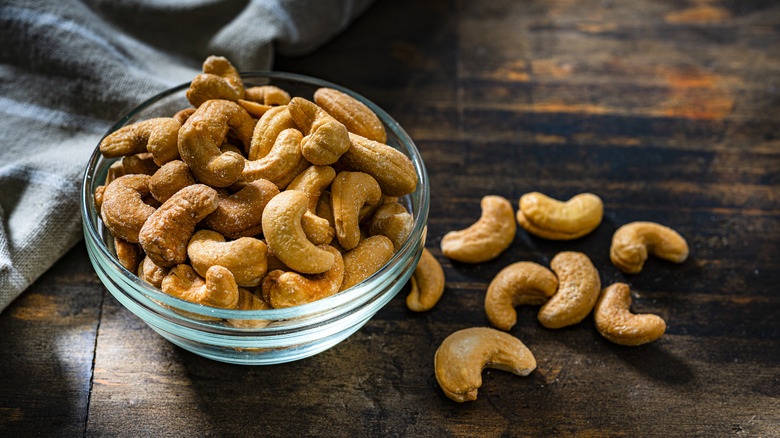Eat More Cashews To Prevent This Common Disease
Pick through your favorite can of assorted nuts. You'll probably have a few peanuts, which technically are legumes. Maybe you'll have some almonds, too, but they technically aren't nuts but seeds. Those sweet cashews? Nope, they're seeds, too, and you'll find the cashew seed growing underneath what looks like an apple on the cashew tree. Yet these buttery yet somewhat sweet snacks have much of the same nutritional value as nuts.
The 157 calories in 1 ounce of raw cashews mostly come from fat, but just 2 grams of saturated fat. That means you'll get 9 grams of unsaturated fat in that handful of cashews. Unsaturated fats play a role in easing inflammation and improving cholesterol. The main unsaturated fat in cashews is oleic acid, which is what makes olive oil healthy. The 7 grams of oleic acid works to block cholesterol from being absorbed and reduces the buildup of fats on your artery walls. According to the National Heart, Lung, and Blood Institute, high cholesterol can increase your risk of heart disease. That's why eating cashews every day may reduce your risk of heart disease.
Cashews may benefit cholesterol and blood pressure
The Food and Drug Administration excluded cashews from its qualified health claim about nuts because they're too high in saturated fats that typically affect cholesterol. However, 40% of the saturated fat of cashews comes from stearic acid, which has little effect on cholesterol. That's why a 2017 study in The American Journal of Clinical Nutrition sought to learn how cashews affect cholesterol. People who consumed between 28 grams to 64 grams (about one or two ounces) of cashews a day lowered their cholesterol by almost 4% in 28 days compared to eating potato chips. They also reduced their LDL cholesterol by almost 5%.
Another risk factor for heart disease is high blood pressure. A 2019 meta-analysis in Current Developments in Nutrition combined the results of five studies that investigated the benefits of cashews on blood pressure and cholesterol. Although the analysis didn't find significant changes in cholesterol levels, cashews do have a lowering effect on triglycerides. Cashews can also reduce systolic blood pressure by 5 points and diastolic blood pressure by 1 point.
Other reasons to eat more cashews
The oleic acid in cashews isn't just great for your cardiovascular health. According to a 2020 review in Advances in Nutrition, diets rich in oleic acid might be able to reduce visceral (belly) fat, stimulate how your body uses energy, and help regulate your food intake. A 2023 article in Nutrients found that oleic acid affects the flexibility of our cell membranes and gene expression. It also boosts our antioxidant defenses and fights inflammation.
Aside from the heart-healthy fats, the 5 grams of protein in cashews make a great snack to keep you feeling full. Among the amino acids in cashews is 603 milligrams of arginine. When your body turns arginine into nitric oxide, it can improve blood flow and relax your arteries. You also won't find a single gram of cholesterol in this plant food. Cashews provide 20% of your daily magnesium to help regulate your blood pressure and nerve function. You'll also find that cashews are good sources of iron, selenium, and zinc.



